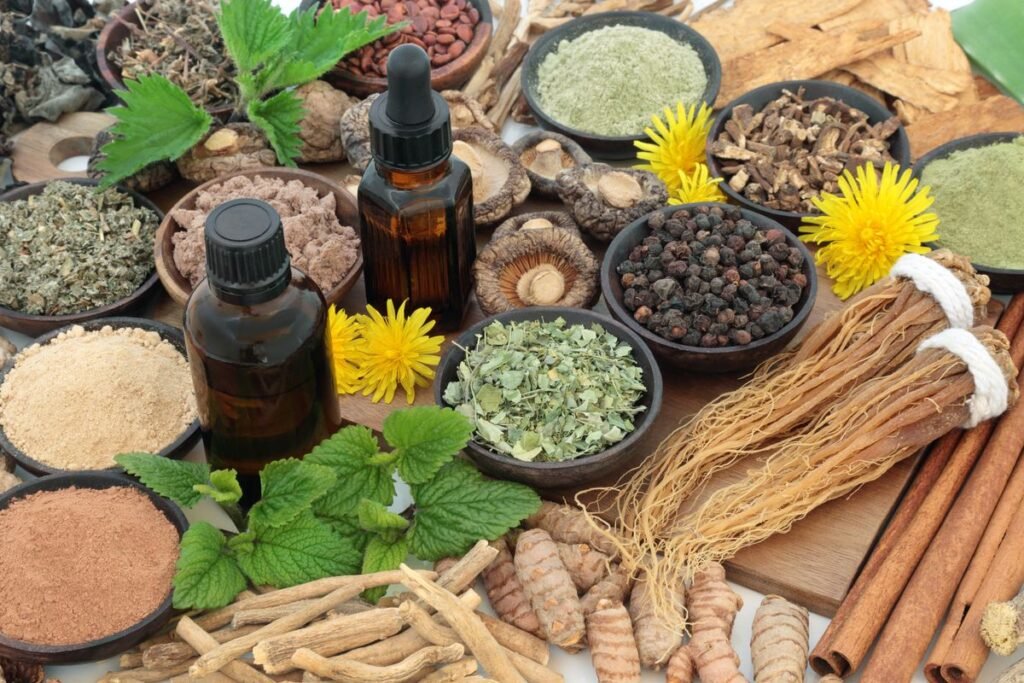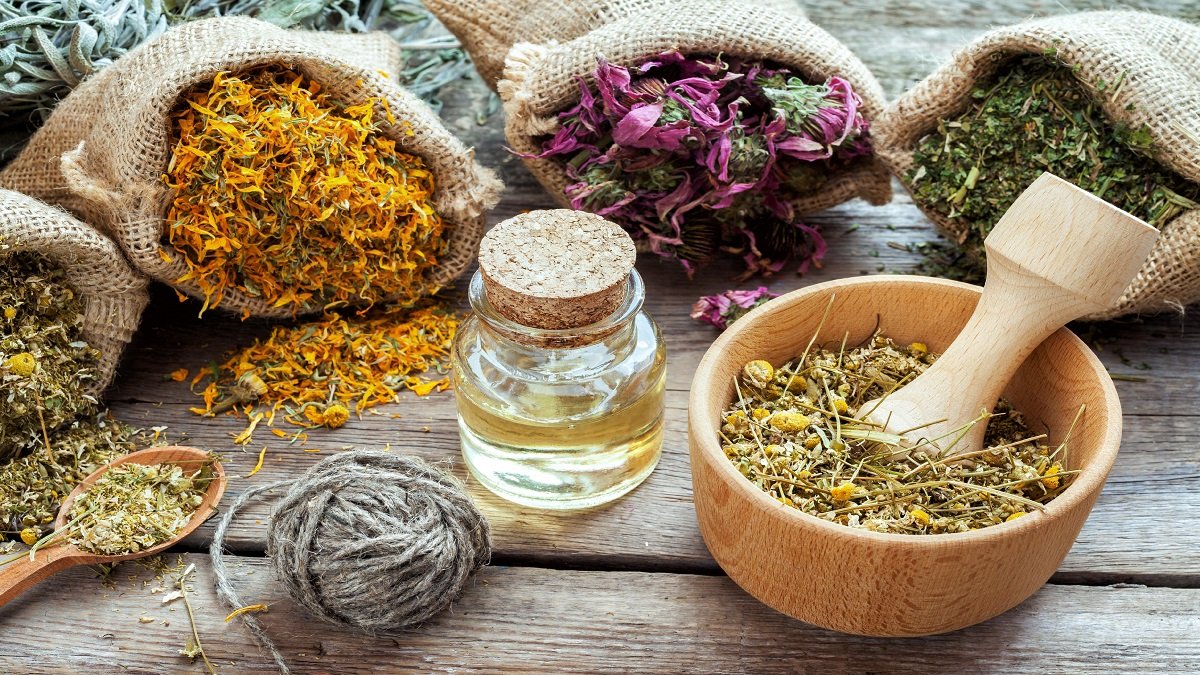When combined with a healthy diet, regular exercise, and restful sleep, some herbs to boost energy—such as ginseng and ashwagandha—may help increase energy levels. Getting enough sleep, maintaining a healthy diet, and engaging in at least 150 minutes of exercise weekly are the most crucial components for energy and mental clarity.
Several herbal supplements might improve your mental and physical well-being. Nevertheless, some plants may have adverse effects and interact with commonly prescribed drugs. It’s crucial to consult a healthcare provider before using any herbal remedies for energy.
These Herbs Can Boost Energy And Focus

1. Ginseng
The well-liked herbal supplement ginseng is well-known for its anti-inflammatory, antioxidant, and energy-enhancing qualities. A review from a study suggests it may enhance brain activity, making it one of the popular herbs to boost energy and mental performance. The most researched kind in human trials is Panax ginseng.
It is believed that ginsenosides, eleutherosides, and ciwujianosides—among other compounds—are responsible for the performance and energy-boosting benefits of ginseng. Ginseng supplements may also help increase mental clarity, reduce fatigue, and enhance physical performance. Daily dosages of 200 mg have been linked to positive outcomes.
It’s crucial to remember that ginseng may cause adverse effects. Moreover, it can interact with commonly used medications, including those for heart disease, diabetes, and depression.
2. Sage
The cognitive-enhancing properties of sage (Salvia) may assist in improving memory, attention, and energy levels. Sage improved 26 cyclists’ memory, perceived effort, and response time, according to a small study. In their review of the literature, the study’s authors also noted that sage supplements could aid with mood, alertness, concentration, memory, and word recall.
Additionally, sage may inhibit acetylcholinesterase (AChE). Acetylcholine, a neurotransmitter crucial to brain function, is broken down by this enzyme. AChE inhibitors increase acetylcholine availability in the brain, potentially improving cognitive performance. It’s important to note that research on sage’s benefits has focused on the larger doses found in supplements rather than the smaller amounts used in cooking.
3. Ashwagandha
For thousands of years, people have used this healing herb with medicinal benefits for its therapeutic effects. The adaptable herb is often used in Ayurvedic medicine, India’s ancient medical system, to increase vitality, lower stress and anxiety, and lessen pain and inflammation.
According to research, this potent plant helps lower stress and anxiety by dramatically reducing cortisol levels, the main stress hormone. It is known to be an adaptogen—a compound that aids in stress resistance.
Because ashwagandha may increase testosterone levels in men, it is also used to enhance male sexual health. The woody plant’s root is said to improve intimate pleasure, boost libido (intimate desire), and assist with erectile dysfunction.
4. Guarana
Due to its stimulating properties, guarana is often utilized as an ingredient in energy beverages and supplements. Coffee may not contain as much caffeine as guarana, which is derived from the Paullinia cupana seed. According to research, coffee beans contain 1–3% caffeine, while Paullinia cupana seeds contain 2–8%.
Theophylline and theobromine, two substances that increase energy, are also abundant in the seeds. Although research on humans has shown conflicting findings, some studies have demonstrated that guarana tea consumption or supplementation may improve memory, alertness, and attention.
The effects, however, are often transient. Additionally, it’s critical to understand the potential negative consequences of guarana overconsumption.
5. Chamomile
The flower and one of the herbs that boosts energy are indigenous to Asia, India, and Western Europe. These days, it may be grown anywhere in the United States. German chamomile, which is native to southern and eastern Europe, and Roman chamomile, a perennial native to northern Africa and southern and western Europe with an apple-like scent, are the two main varieties.
In the US, chamomile is a well-liked herbal remedy often used to ease anxiety and promote relaxation. Using chamomile as a tea is likely safe. Moreover, short-term oral use may also be safe. However, the long-term safety of chamomile use for medical purposes is not well understood.
Chamomile is used throughout Europe to help heal wounds and reduce swelling and inflammation. According to research, chamomile flower components accelerated wound healing compared to a placebo. The study’s authors noted that the high phytochemical content in chamomile flowers is likely responsible for promoting wound healing.
According to a review, chamomile is a plant with several benefits. Its antioxidant, antibacterial, antidepressant, anti-inflammatory, antidiabetic, and antidiarrheal properties make it a popular choice. Furthermore, it helps treat gastrointestinal issues, ulcerative colitis, premenstrual syndrome, and knee osteoarthritis.
6. Echinacea
The daisy family includes the blooming plant Echinacea. Early to late summer is when the flower’s large, pink petals open. Echinacea is a plant that grows in eastern and central North America. Its leaves, stalks, and roots are often used in medicine.
Toothache, gut discomfort, snake bites, convulsions, skin irritation, arthritis, and cancer have all been treated with echinacea in the past. Echinacea is becoming a popular home remedy for preventing or reducing the severity of the flu and common cold. It is also often used to promote the healing of wounds.
Many compounds found in echinacea are thought to have antiviral, antioxidant, pain-relieving, and anti-inflammatory properties. Echinacea may help prevent upper respiratory infections, according to some research. Its effectiveness in preventing or reducing the duration of a cold, however, requires more research.
Read More: 8 Benefits of Mushroom Coffee
7. Garlic
Native to Central Asia, garlic is a perennial plant cultivated for its tasty bulbs. Many civilizations now cultivate this crop worldwide. Garlic is prized for its therapeutic qualities as well as its culinary uses. Humans have used garlic for thousands of years. It has long been used in medicine to treat intestinal worms, liver disease, colic, tuberculosis, infection prevention, blood pressure reduction, and fever.
This healing herb contains compounds with antibacterial, anti-inflammatory, and anti-cancer properties. Garlic has been shown to decrease blood pressure and reduce the risk of stroke and heart attack. Certain cancers may be prevented by eating garlic. According to research, consuming raw or cooked garlic daily may lower the risk of colorectal cancer.
8. Peppermint
The use of peppermint oil in aromatherapy is common. According to research on both humans and animals, the scent of peppermint essential oil—a cross between water mint (Mentha aquatica) and spearmint (Mentha spicata)—may assist in increasing mental clarity and vitality.
To support the use of peppermint oil for cognitive function, further study is necessary. You might try adding a few drops of peppermint essential oil to a steam bowl or diffuser. The safety profile of peppermint essential oil is favorable. However, using peppermint oil orally may result in certain gastrointestinal side effects, such as nausea, stomach discomfort, and heartburn.
9. Rosemary
Similar to peppermint, rosemary essential oil’s scent may enhance cognitive function. A review of mouse research revealed that rosemary oil had anti-inflammatory and antioxidative qualities that might improve cognition, memory, and learning.
Additionally, several human studies have shown that exposure to rosemary oil may enhance performance on cognitive tests, including accuracy, speed, and memory. The authors of the paper point out that this might help senior citizens and guard against neurological diseases like Alzheimer’s. However, they conclude that further study is required to fully understand rosemary’s role in cognition.
Wrapping Up
The FDA does not monitor dietary supplements as closely as it does prescription and over-the-counter drugs. This means that the FDA does not check supplements and herbs to boost energy for their usefulness or contents before they are sold in stores.
It does, however, require producers to observe good manufacturing practices and ensure the products are safe. Because of this, there is a chance that some supplements don’t include the ingredients or the correct amounts claimed on their labels. In rare cases, they could even be tainted with harmful substances such as heavy metals, herbicides, or undeclared medications.
Selecting supplements that independent third-party organizations have evaluated is crucial for your protection as a consumer. Certifications from bodies such as ConsumerLab, the United States Pharmacopeia (USP), or the National Sanitation Foundation (NSF) offer a higher degree of confidence.
These organizations assess supplements for quality, purity, and label accuracy, helping consumers make safer, more informed choices. However, even third-party testing doesn’t guarantee that a supplement is appropriate for your specific health needs. That’s why it’s recommended to consult a trained healthcare professional before starting any new supplement.
A pharmacist, registered dietitian nutritionist (RD or RDN), or licensed healthcare provider can help determine whether a supplement is necessary, how it might interact with your current medications, and what dosage is appropriate for your condition.
In summary, although supplements can play a valuable role in supporting health—especially in cases of nutritional deficiency or specific health goals—it’s essential to approach them with caution. Look for verified products, read labels carefully, and always seek expert guidance to ensure your choices support, not compromise, your overall well-being.
FAQ
Q: What advantages do herbs offer?
A: Herbs have several advantages, such as having possible medical uses and having anti-inflammatory and antioxidant effects. Phytochemicals, which are advantageous plant substances that may help reduce inflammation and guard against cell damage. Certain herbs are particularly well-known for certain health advantages, such as strengthening immunity, promoting sleep, and improving cognitive function.
Q: What use do herbs have in daily life?
A: In addition to being used to make food, herbs have therapeutic properties. Diabetes, cancer, and heart disease are among the illnesses that herbs are used to treat and prevent. Around the planet, herbs will be cultivated. A lot of people will grow herbs in their gardens and utilize them in their daily lives.
Q: Are there any side effects of herbs?
A: Herbal medicines are generally harmless, but sometimes they have negative side effects. These may include gastrointestinal distress, insomnia, and joint or muscle discomfort. Your prescription medicine and some herbal treatments may interfere.











